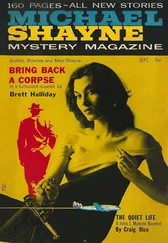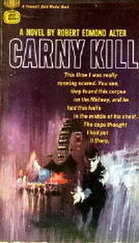The following day Wilson Block exchanged a few more words with the woman, including their names. She was Mrs. Elizabeth Ayer and her husband had been dead a month. So far, so good.
Within a week, Block was riding back to the city in her car instead of using a bus or taxi. He had a perfectly fine sedan of his own, but he never used it at times like this unless his target didn’t have transportation.
He invited her to lunch one day and she accepted. From then on, his progress was swift. Block had always been able to fascinate women. He played whatever role they seemed to need. He prided himself that all of his wives had died happy. Soon there was no more “Mr. Block” and “Mrs. Ayer.” It became Will and Betty.
He found her to be a thoroughly charming woman. Unlike all of his previous conquests, she didn’t exert a silent pressure to be entertained, and she didn’t whine about her misfortune, or try to play upon his sympathy. She held up her end of every conversation with ease and seemed to make every effort to have him feel comfortable.
The day Wilson Block took her hand in his and said, “Betty, I love you and want you to marry me,” he meant every word. He always did. Acting is believing.
Neither of them had relatives or friends, and they had only a few acquaintances. There was no need to delay the wedding for the sake of appearances. Betty never even suggested it. Wilson had already filled the void left by her dead husband. He was sure she saw marriage as the next logical step.
Wilson also told her he’d like to move to another town. This way, as he explained it, they could leave the past behind them, and their honeymoon cottage would also be their new home.
“A wife’s place is wherever her husband wants to be,” she answered and kissed him.
More from habit than design. Block checked to see if the new community had a medical examiner. He found that it did. Had he been planning an immediate murder, that would have been a problem. He far preferred cities and towns with elected and untrained coroners. A coroner will often diagnose brucine or strychnine poisoning as a heart attack, but no trained medical examiner would. For a medical examiner, Block had always had to arrange carefully staged accidents, something he found extremely bothersome.
Happily, for once in his life he wanted a wife more than a funeral. Betty was everything his other wives had never been, and he suddenly realized she was everything he needed. He was sixty-three. He had all the money he would ever need. It was about time he retired, and he couldn’t pick a better time. Betty hung onto his every word, catered to his every whim. He’d never had it so good.
He found himself enjoying domestic life. If his first marriage had been half as satisfying, he might never have hastened its end. Betty had absolutely no faults. She cooked to rival a cordon bleu chef. She kept a spotless house, but never nagged him for his sloppy ways, and she baked well enough and often enough to keep a constant stream of neighborhood children at the rear door.
The only household duties she reserved for him were the ones that traditionally fell to the male: he fixed leaky faucets, replaced blown fuses, and carried out the garbage at night.
One evening three months after they moved into their new home, he picked up the bag of kitchen scraps and took it outside. He carefully descended the concrete rear steps, but placed his foot on a child’s roller skate that had been left on the walk. His leg flew out from under him, the bag of trash soared high, his arms went wide and he toppled backward. His startled cry ended abruptly when his head struck the edge of a concrete step with a sickening thump.
Betty stood at Wilson’s grave and felt very unhappy. She hated cemeteries. During her forty-one years she had buried over fifteen husbands, so she was an expert on cemeteries — but she didn’t like them.
The Big Trip
by Elsin Ann Graffam
This was the part of the day that Nancy liked best. Dishes done, place straightened, time to rest in bed, sip a cup of tea, watch TV and have a cigarette.
Being alone wasn’t such a bad thing, she’d come to think. No man to order her around, no children to cause her grief. Just two aloof cats, a small apartment, and her TV. The last of life for which the first was made. She was alone the first part, she’d be alone the last part. And that was fine with her. One thing she had come to treasure was her independence. Other women her age had ties. Not Nancy. Her life was her own, every minute of it, and that was exactly the way she wanted it.
Carefully, frugally, all these years she had saved her money for the Big Trip to Europe. It had become a joke at the office, the extent to which Nancy would go to hang on to her money. Once she had heard June say, “If old Nancy can’t take it with her, then she’s not going!”
Let them laugh, she thought. When they were old, living on a pension, they would remember her — Nancy and her Big Trip Around the World. Yes, let them laugh, they who had no thought for the future, who lived from day to day, spending their money as fast as they got it.
Now she was having the joy of planning the trip, going to travel bureaus on her lunch hour, deciding on the clothes she’d buy. Oh, the countries she’d see! Switzerland, for sure. And Spain, the Netherlands, England, Italy — the world would be hers!
Retirement in two short months — and then the fun would begin! The money was ready, safely tucked away in her mattress, hundreds and hundreds of dollar bills. Just two months to wait!
She shut her eyes, smiling, thinking of the moment she’d get on the airplane, when the Big Trip would finally begin...
“What’s she blabbering about now?”
The other woman shrugged. “Same old thing. How she’s going to go to Europe and see everything. I kinda feel sorry for her, you know?”
“Uh, uh. Don’t go feeling sorry for them, Joan. You gotta harden your heart or you’ll go crazy working here, you should excuse the expression.”
The woman laughed. “Yeah. Anyhow, I guess she’s happy enough. I mean, look at her, off in that dream world of her own.”
“Funny thing about her,” the woman mused. “I was here when they admitted her, ten years ago. Seems she was just as normal as you and me until one night she fell asleep smoking in bed. Neighbors got her and her cats out in time. She wasn’t burned much at all, but by the time the firemen got there, her apartment was ruined, every bit of furniture burned to a cinder. You wouldn’t think that would make someone go insane, would you?”
Dutch
by William F. Nolan
Dutch got the idea when we were in Beverly Hills. It was late, almost midnight, and the whole town was quiet as a grave. All the fancy stores were dark and we could hear our own footsteps like clapped hands on the pavement. Me and Dutch and Rosa. She was one of his chicks. Dutch had plenty others.
Rosa was seventeen, a real little doll, like you find on the shelf of a toy store, all in blue and pink. She always dressed real nice when Dutch asked her out.
Dutch was eighteen and he looked like a movie star. I mean, handsome in a dark, curly-haired kind of way. The chicks flipped over him. Rosa, for instance.
Me, I’m Eddie Conners, and in the looks department I don’t score. Year younger than Dutch; short, with thick glasses. Dutch always used to tell me that my eyes looked like two crazy fish swimming around behind the lenses. The chicks pass me by, and I guess I don’t blame them any. Sometimes Dutch would fix me up with a cute chick, but she’d spend more time looking at him than she would me when we double-dated.
Anyway, on this particular night Dutch got the idea we should cop a couple of new irons and have ourselves a little dice over Mulholland Drive.
Читать дальше












